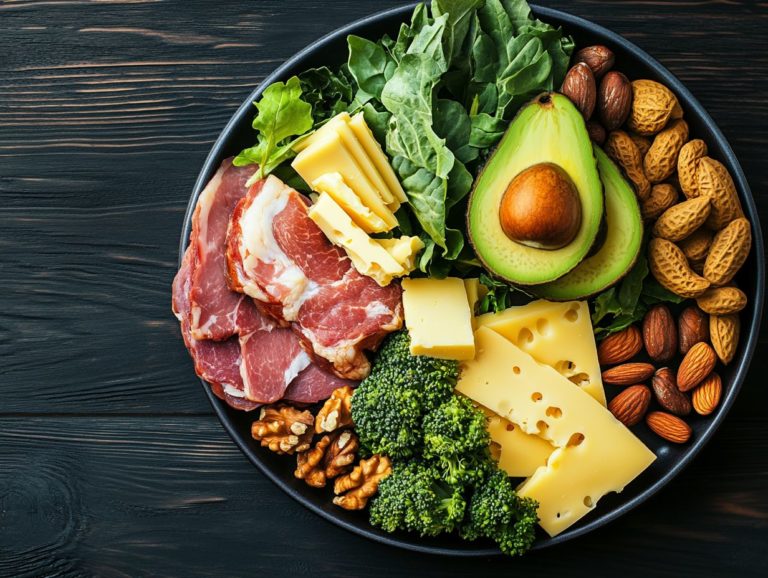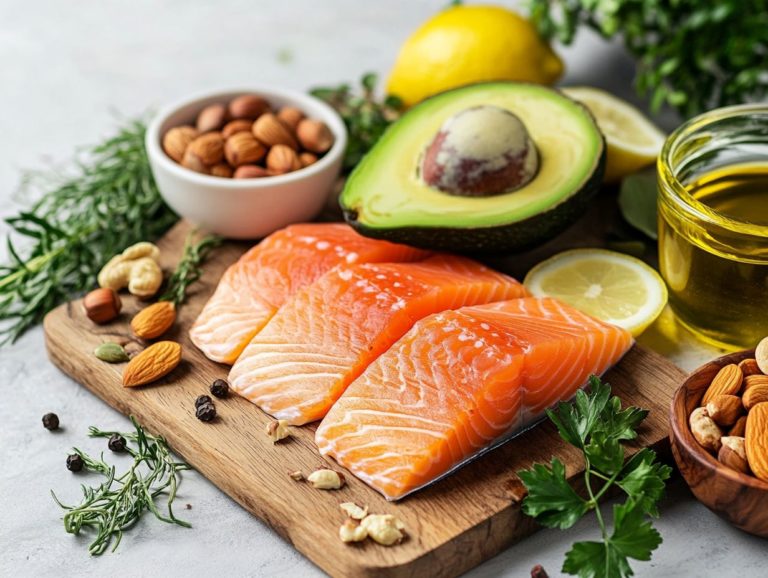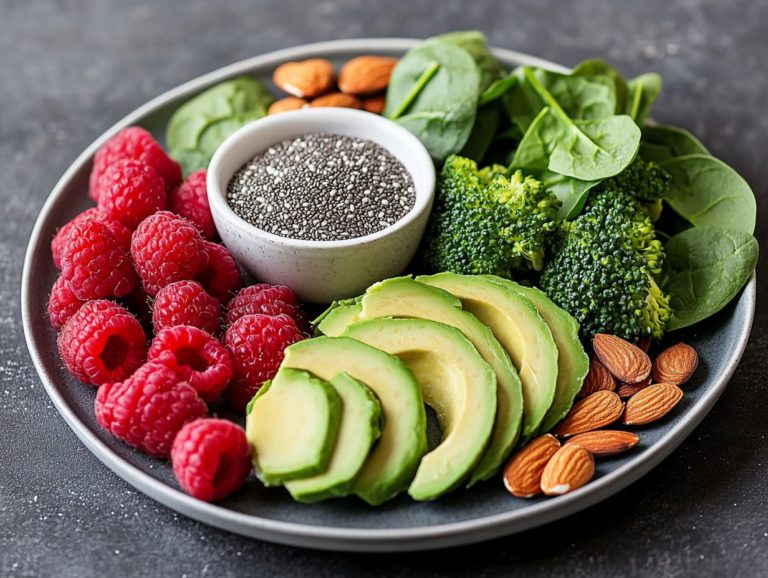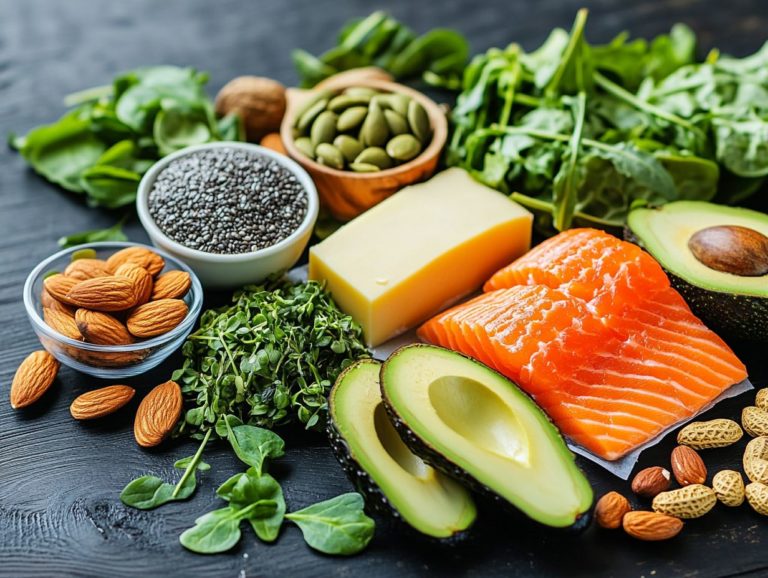Keto Diet: Importance of Omega-3s
If you re navigating the Keto diet or even experimenting with the Paleo diet, you ve likely come across the emphasis on healthy fats. But have you truly considered the pivotal role that Omega-3 fatty acids and other essential fats play?
This nutrient supports your health and boosts your Keto journey. You ll find that understanding what the Keto diet entails and recognizing the significance of Omega-3s can be transformative. It can aid in weight loss, improve metabolic syndrome, and offer a myriad of other health benefits.
We will showcase delicious food sources and effective omega-3 supplements such as fish oil capsules and even fish oil liquid that can elevate your Omega-3 intake. Immerse yourself in this exploration to discover how you can optimize your Keto experience with these powerhouse fats, improve fat metabolism, and bridge nutritional gaps!
Contents
- What is the Keto Diet?
- What are Omega-3s?
- Why are Omega-3s Important on the Keto Diet?
- What Foods are High in Omega-3s?
- What Supplements Can Be Taken to Increase Omega-3 Intake on the Ketogenic Low-Carbohydrate Diet?
- What Are the Recommended Dosages for Omega-3 Supplements on the Ketogenic Diet?
- What Are the Risks of Omega-3 Deficiency on the Keto Diet?
- What Are the Symptoms of Omega-3 Deficiency on the Ketogenic Diet?
- Frequently Asked Questions
- What is the Keto Diet and why is it important to include Omega-3s?
- What are the benefits of including Omega-3s in a Keto Diet?
- Where can I find sources of Omega-3s on a Keto Diet?
- Can I take Omega-3 supplements while on a Keto Diet? What about fish oil?
- Are there any risks or health risks to consuming Omega-3s on a Keto Diet?
- Can I still follow a Keto Diet if I am vegetarian or vegan? What about the Paleo or Caveman Diet?
Key Takeaways:
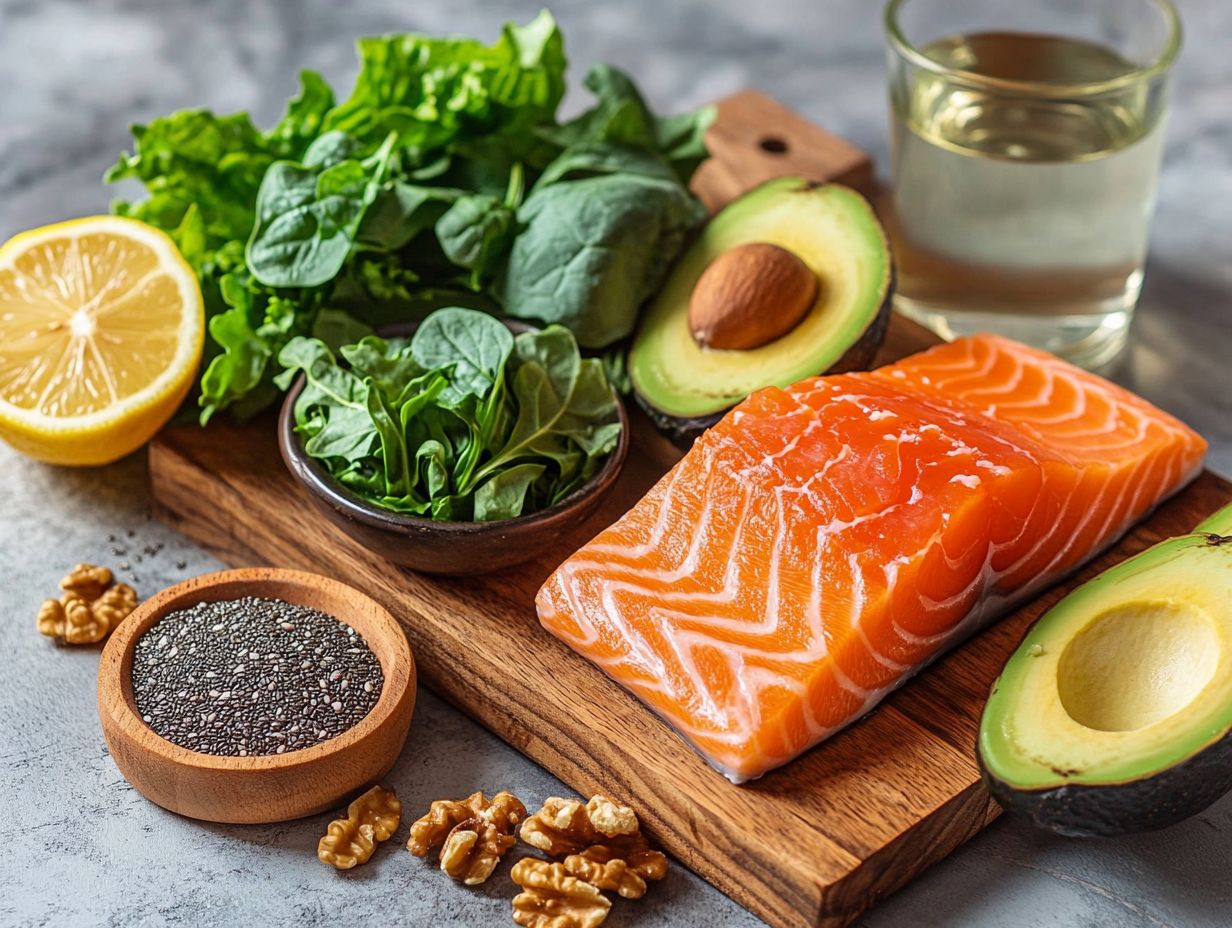
- Omega-3s are essential for optimal health on the keto diet, aiding in weight loss, blood sugar regulation, and providing numerous other health benefits.
- Incorporating foods high in omega-3s, such as fatty fish and certain nuts and seeds, is crucial for meeting daily requirements.
- Supplements, including fish oil capsules and algae-based options, can also be taken to increase omega-3 intake, with recommended dosages varying based on individual needs and goals.
What is the Keto Diet?
The Keto Diet, scientifically known as the ketogenic diet or ketogenic low-carbohydrate diet, is a low-carbohydrate, high-fat eating plan that has drawn considerable interest for its potential health benefits. You may find it particularly appealing for effective weight loss, better body weight management, and improved control over metabolic syndrome.
This dietary approach encourages your body to enter a state of ketosis, where it efficiently burns fat for energy instead of relying on carbohydrates. This shift makes it a favored choice for individuals looking to enhance fat metabolism and overall well-being.
The keto diet emphasizes healthy fats and essential fatty acids, laying a robust foundation for optimal health and wellness.
What are Omega-3s?
Omega-3s are essential fatty acids that significantly influence your overall health, supporting a multitude of bodily functions, including brain health and how well your brain works. These healthy fats are celebrated for their various health benefits, from reducing inflammation to enhancing heart health and aiding in weight loss.
You can easily incorporate omega-3s into your diet through sources like fatty fish, fish oil supplements, and even plant-based alternatives such as flaxseeds and chia seeds. By making omega-3s a vital part of your balanced diet, you re not just promoting wellness; you re also investing in your longevity.
Why are Omega-3s Important on the Keto Diet?
Omega-3s hold a vital place in your keto diet, thanks to their remarkable ability to enhance fat metabolism, support healthy blood lipid profiles including LDL-C and HDL-C, and deliver a range of health benefits that are perfectly in tune with ketogenic principles.
The keto diet benefits greatly from omega-3 fatty acids. They not only help balance your omega-6 intake but also bolster cognitive function and reduce the potential nutrient deficiencies that may arise from your restricted food choices.
By seamlessly integrating omega-3s into your keto regimen, you can unlock improved fat burning and better management of glucose intolerance today! Make omega-3s a critical part of your nutritional strategy!
How Do Omega-3s Help with Weight Loss on the Keto Diet?
Incorporating omega-3s into your keto diet can be a game changer for weight loss. These essential fatty acids enhance fat-burning processes and improve how well your body burns energy, creating a more effective strategy for shedding those extra pounds and achieving better body weight control.
By helping to regulate insulin levels, manage glucose intolerance, and reduce inflammation, omega-3s contribute to a healthier metabolic state that’s conducive to weight loss. When you include omega-3-rich foods and supplements in your ketogenic meal plan, you optimize your body s ability to utilize fats for energy while also improving your overall health outcomes.
Research supports this, revealing that omega-3 fatty acids can boost the expression of genes linked to fat oxidation and diminish fat accumulation in the body. A study published in the journal ‘Nutrition & Metabolism’ highlighted that individuals consuming higher amounts of omega-3s experienced a notable decrease in body fat compared to those with lower intake.
Omega-3s also enhance insulin sensitivity, a critical factor in regulating blood sugar levels and preventing the storage of excess body fat. Reducing inflammation is equally important, as chronic inflammation is often tied to obesity and metabolic disorders.
Those following a keto diet supplemented with omega-3s may enjoy better control over cravings and appetite, paving the way for healthier eating patterns and sustainable weight loss.
What Are the Other Benefits of Omega-3s on the Keto Diet?
Beyond the pursuit of weight loss, omega-3 fatty acids present you with a multitude of health benefits while on the keto diet. They can enhance cognitive function, reduce the risk of metabolic syndrome, and help mitigate nutrient deficiencies that might arise from restrictive eating patterns.
These powerful fatty acids are celebrated for their support of heart health, ability to elevate mood, and anti-inflammatory properties, making them an essential component of your ketogenic lifestyle. Prioritizing omega-3 intake helps you reach your weight loss goals and unlock exciting health benefits!
Research underscores the vital role omega-3s play in promoting brain health, potentially lowering the risk of neurodegenerative diseases. A study published in the ‘Journal of Nutrition’ found that participants with elevated omega-3 levels demonstrated improved memory and cognitive performance.
The heart-healthy benefits of these fatty acids are well-documented, with numerous clinical studies revealing a reduction in triglyceride levels and enhanced overall cardiovascular function.
For those adhering to a keto diet which may sometimes lack certain essential nutrients omega-3s can effectively bridge the nutritional gaps. This ensures a more balanced intake while deftly avoiding the deficiencies often linked to low-carb eating patterns.
What Foods are High in Omega-3s?
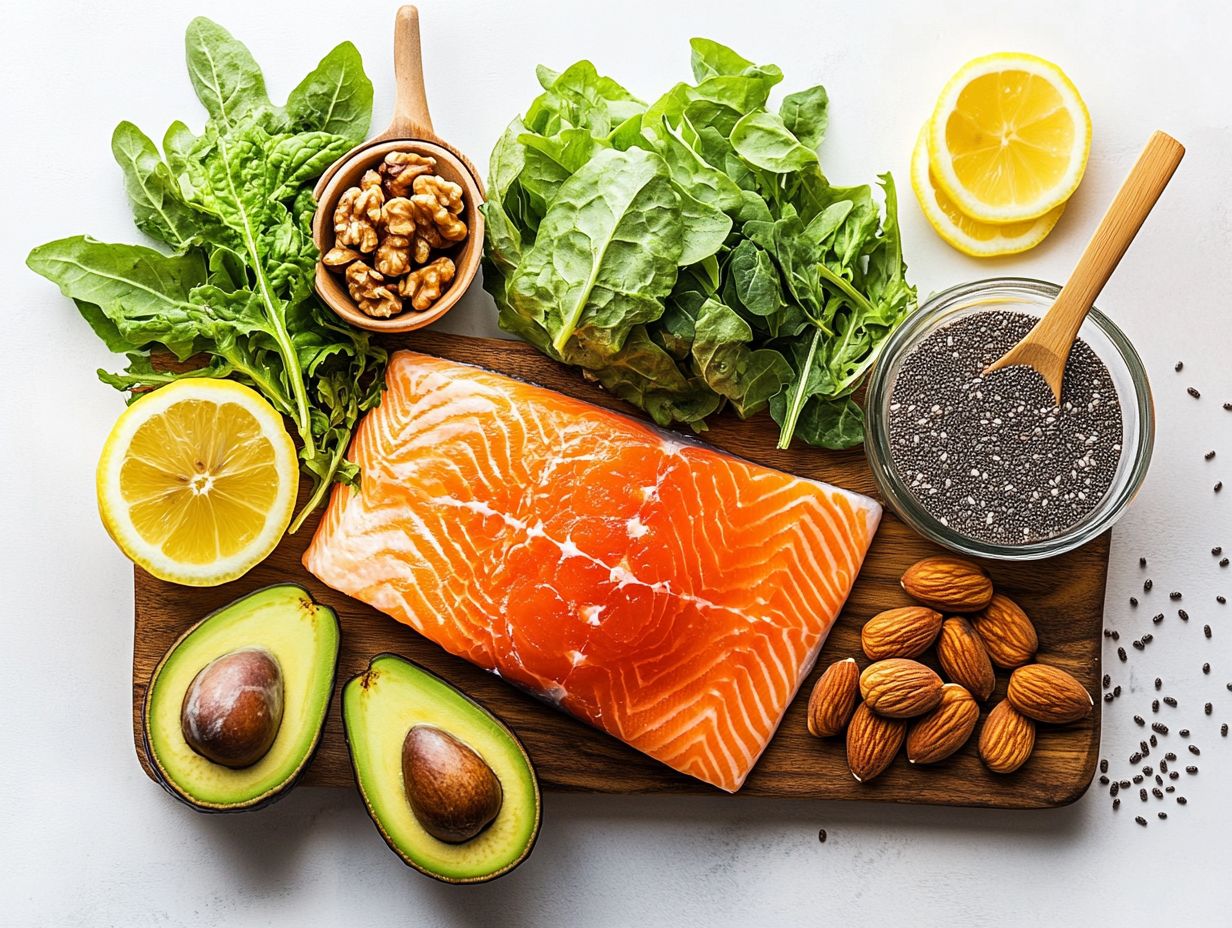
Foods rich in omega-3s are vital for your balanced diet, especially if you re following a keto plan. These nutrients play a crucial role in preventing deficiencies.
- Fatty fish like salmon, mackerel, and sardines
- Fish oil supplements to boost your overall intake
- Chia seeds, flaxseeds, and walnuts as excellent plant-based alternatives
Embracing a variety of these options will help you maintain a diverse and nutrient-dense diet.
What Are the Best Sources of Omega-3s?
The finest sources of omega-3s are right at your fingertips. They range from a variety of fatty fish and fish oil supplements to select plant-based foods, all effortlessly fitting into a healthy dietary plan. Fish such as salmon, mackerel, and sardines are exceptionally rich in EPA and DHA the most beneficial forms of omega-3s. These fish make a vital addition to your diet.
If you re vegetarian or simply want to broaden your omega-3 repertoire, walnuts, chia seeds, and flaxseeds are excellent alternatives. This variety ensures that every dietary preference is accommodated.
Incorporating these omega-3-rich foods into a keto diet is particularly advantageous. Their high-fat content aligns seamlessly with the principles of low-carb eating and supports better digestion. For example, fatty fish not only provide essential fatty acids but are also low in carbohydrates, making them an ideal choice for anyone aiming to maintain ketosis.
You can easily sprinkle walnuts and flaxseeds on salads or blend them into smoothies. This adds both healthy fats and valuable micronutrients and electrolytes to your meals.
Integrating these diverse sources into your diet ensures a well-rounded nutrition plan. It promotes heart health, reduces inflammation, and supports cognitive function.
Top Vegetarian Sources of Omega-3s
Vegetarian sources of omega-3s include a range of healthy foods that can significantly enhance your overall health and well-being. This is particularly beneficial if you’re following a plant-based dietary plan or a cleansing process.
Foods like chia seeds, flaxseeds, hemp seeds, and walnuts are standout sources of ALA. ALA is a type of omega-3 that your body can convert to EPA and DHA, even though that conversion isn’t particularly efficient.
By incorporating these foods into your meals, you increase your omega-3 intake. You also help address nutrient deficiencies that often accompany a diet devoid of animal products. These foods can also help reduce health risks linked to low omega-3 intake.
Many plant-based diets, including the paleo diet and ketogenic diet, tend to fall short on these essential fatty acids. That’s why it’s vital to focus on integrating such sources into your meals.
Take chia seeds, for example they’re incredibly versatile. You can easily sprinkle them on yogurt or blend them into smoothies. Flaxseeds can be ground and added to baked goods or oatmeal for a nutritious twist.
Hemp seeds bring a delightful nutty flavor and can be tossed into salads or blended into dressing. Walnuts make for a satisfying snack or an excellent addition to various dishes for a bit of extra crunch.
By creatively weaving these ingredients into your meals, you can fully embrace the benefits of omega-3s. This promotes heart health, reduces inflammation, and supports brain function all while maintaining your commitment to a ketogenic lifestyle. Incorporating intermittent fasting can further enhance the autophagy process and improve fat burning.
What Supplements Can Be Taken to Increase Omega-3 Intake on the Ketogenic Low-Carbohydrate Diet?
Looking to boost your omega-3 intake effortlessly? Supplements are your best bet! They present a convenient solution for enhancing your omega-3 intake while following the keto diet.
Options like fish oil capsules and liquid fish oil from reputable brands like Bare Biology deliver concentrated doses of these essential fatty acids. This makes it simple to ensure you receive adequate amounts of EPA and DHA.
This is particularly advantageous for those who may find it challenging to meet their omega-3 requirements through food sources alone. For vegetarians and vegans, algae-based omega-3 supplements provide a plant-friendly alternative, allowing everyone to enjoy the numerous benefits these vital nutrients offer.
These supplements also help in maintaining balanced blood lipid profiles, which is crucial for overall health. Don t miss out on the heart-healthy benefits of omega-3s!
What Are the Recommended Dosages for Omega-3 Supplements on the Ketogenic Diet?
Are you getting enough omega-3s on your keto journey? When considering omega-3 supplements on the keto diet, recommended dosages can vary significantly based on your individual health needs. General guidelines suggest aiming for a daily intake of 250 to 500 mg of combined EPA and DHA for most adults. This is supported by clinical research indicating its benefits for both heart and brain health.
However, if you’re targeting specific health benefits, higher dosages may be necessary, especially for weight loss or managing metabolic issues. Consult a healthcare professional to determine the most suitable dosage tailored to your personal health goals and dietary conditions. Michael Mosley, a well-known health expert, emphasizes the importance of personalized supplement regimes to maximize health benefits.
For enhancing your heart health, you might benefit from a daily intake closer to 1,000 mg. If you’re dealing with inflammatory conditions or metabolic issues, you may need to consider even larger amounts, but only under professional guidance.
Keep in mind that various factors such as age, gender, and existing health complications can also shape these recommendations. Consulting with your healthcare provider is essential to ensure that any potential interactions with medications or risks associated with excessive intake are appropriately managed. Monitoring insulin levels and blood sugar when adjusting your supplement intake is equally important.
Before tweaking your supplementation routine, discussing your plans with a qualified professional not only provides personalized advice but also enhances the overall safety of incorporating omega-3s into your diet.
What Are the Risks of Omega-3 Deficiency on the Keto Diet?
Omega-3 deficiency can present serious health risks, especially for those following the keto diet, where restrictive eating patterns may create nutrient gaps. This can lead to poor fat metabolism and other metabolic issues.
When your intake of omega-3s is insufficient, you could face a range of adverse health outcomes, including heightened inflammation, diminished cognitive function, glucose intolerance, and an increased risk of heart disease.
It s essential to recognize the signs of omega-3 deficiency and understand its implications to maintain optimal health while adhering to a ketogenic dietary plan. Nutrient deficiencies in essential fats can lead to various health complications.
What Are the Symptoms of Omega-3 Deficiency on the Ketogenic Diet?
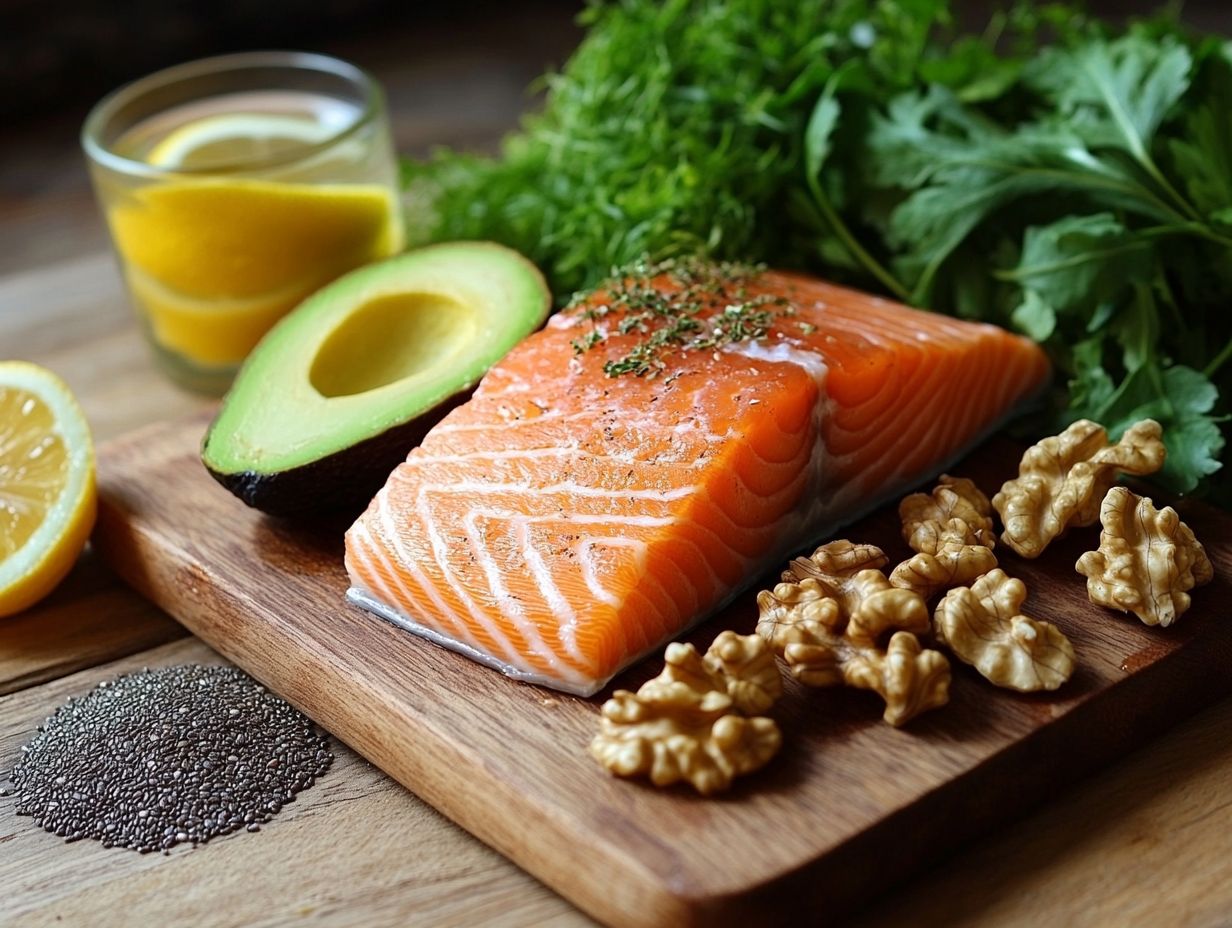
Symptoms of omega-3 deficiency can present themselves in various ways, particularly for those adhering to a keto diet. The restriction of certain food groups may hinder your ability to maintain an adequate intake. Common signs include dry skin, fatigue, mood swings, cognitive decline, and joint pain each of which can significantly affect your overall well-being and body weight control.
Being aware of these symptoms is crucial for anyone on a ketogenic dietary plan to ensure that nutritional needs are met effectively. The benefits of omega-3 fatty acids, found in fatty fish and certain nuts, are substantial, playing a key role in heart and brain health while also reducing inflammation.
However, if you’re following a strict keto regimen, you might be less inclined to consume these sources due to their carbohydrate content, which heightens the risk of deficiency.
Thus, it’s essential to regularly monitor your omega-3 intake and consider supplements if necessary. Recognizing these symptoms early allows you to take proactive measures, ensuring optimal health and stability while reaping the rewards of a ketogenic lifestyle. If you notice these signs, assess your omega-3 intake today to ensure a healthier you!
How Can Omega-3 Deficiency Be Prevented on the Keto Diet?
Preventing omega-3 deficiency while following a keto diet involves thoughtfully incorporating a variety of nutrient-rich foods into your daily meals. This includes integrating fasting methods like intermittent fasting to optimize fat metabolism and the cleansing process.
You can achieve this by regularly enjoying fatty fish, considering fish oil supplements, and including plant-based sources such as chia seeds and flaxseeds to ensure you re meeting your omega-3 needs. Balancing your dietary fats prevents nutrient gaps that can happen with restrictive diets.
To enhance your omega-3 consumption, explore different cooking methods for fatty fish, such as grilling or baking. Not only do these techniques elevate flavor, but they also help preserve the nutrients you seek.
Diversifying the types of fish you eat is equally valuable; aim for a mix of wild-caught varieties like salmon, sardines, and mackerel to truly reap the benefits.
On the plant front, consider adding walnuts to your salads or smoothies. They provide a delightful crunch along with a healthy boost of alpha-linolenic acid (ALA), a type of omega-3 found in plants. It s crucial to stay mindful of your overall omega-6 intake, as excessive amounts can compete with omega-3 metabolism, leading to a less favorable balance of fatty acids in your body.
Balancing these fats helps maintain optimal blood lipid profiles, including levels of LDL-C and HDL-C.
How Can Omega-3s Be Incorporated into the Ketogenic Dietary Plan?
Incorporating omega-3s into your keto diet is a simple yet effective way to elevate the nutritional quality of your meals, offering essential fats that play a vital role in your overall health.
By including fatty fish, fish oil supplements, and plant-based foods rich in omega-3s, you can effortlessly enhance your intake of these crucial fatty acids while staying true to the principles of a ketogenic lifestyle. This dietary strategy not only aids in weight loss but also supports better fat metabolism.
This careful mix of foods boosts how your body processes food and keeps your mind sharp. Incorporating healthy fats from various sources ensures you get a balanced intake of essential nutrients.
What Are Some Delicious Keto-friendly Recipes High in Essential Fatty Acids?
Indulging in delicious keto-friendly recipes that are high in omega-3s and essential fatty acids can effortlessly elevate your meal planning while ensuring you meet your nutritional needs. This makes it easier for you to enjoy a diverse and satisfying diet.
Picture dishes like grilled salmon with avocado salsa, chia seed pudding made with almond milk, and flaxseed meal pancakes. These not only deliver essential fatty acids but also introduce a delightful array of flavors and textures to your meals.
By incorporating these omega-3-rich dishes, you can enhance your overall health while adhering to the principles of a ketogenic lifestyle. Adding healthy foods like leafy greens can make your meals vitamin-packed and nutritious.
These meals burst with flavor and offer amazing health benefits! They support heart health, promote cognitive function, and can even help reduce inflammation. These meals also provide a stable energy source throughout the day.
Take the grilled salmon, for instance. It fulfills your protein requirements while providing a generous dose of omega-3s known to support brain health.
Chia seed pudding serves as the perfect low-carb breakfast or snack, packed with fiber and antioxidants, making it an excellent choice for keeping your energy levels up. Meanwhile, flaxseed meal pancakes offer a delicious alternative to traditional breakfast options while being a superb source of omega-3s.
Each recipe showcases how nutrient-rich ingredients can contribute to your well-being all while staying true to ketogenic principles. The inclusion of fats, fiber, and antioxidants further enhances the nutritional value of these meals.
Try adding these omega-3-rich dishes to your meal plan today!
How Can Omega-3s Be Used as a Nutritious Snack on the Ketogenic Diet?
Omega-3s can serve as delightful snacks on your keto journey. They offer a tasty way to sustain your energy levels and enhance your overall health between meals.
Options like smoked salmon paired with cream cheese, chia seed energy balls, and walnuts are excellent sources of healthy fats and essential fatty acids. These snacks help in better glucose management and maintain satiety.
By incorporating these omega-3-rich snacks into your daily routine, you can effectively support weight loss and maintain healthy eating without straying from your dietary goals. These snacks can also help manage triglycerides and improve overall blood sugar levels.
Try adding flaxseeds for a delicious boost! You can easily sprinkle them on salads or blend them into smoothies. Not only does this enhance flavor, but it also boosts your omega-3 intake. Seaweed snacks present another innovative option; they’re rich in both minerals and omega-3s, making them a perfect crunchy treat. Such snacks also aid in maintaining optimal insulin levels and electrolyte balance.
These snacks align seamlessly with keto principles by keeping carbs minimal while providing valuable nutrients that help maintain satiety throughout your day. Including magnesium-rich foods can further aid digestion and contribute to overall health benefits.
By embracing a diverse array of omega-3 sources and healthy fats, you can further enhance your heart health, reduce inflammation, and elevate your overall well-being. Incorporating omega-6 and essential fatty acids into your dietary plan can help fill any nutrient gaps and support overall body weight control.
Frequently Asked Questions
What is the Keto Diet and why is it important to include Omega-3s?
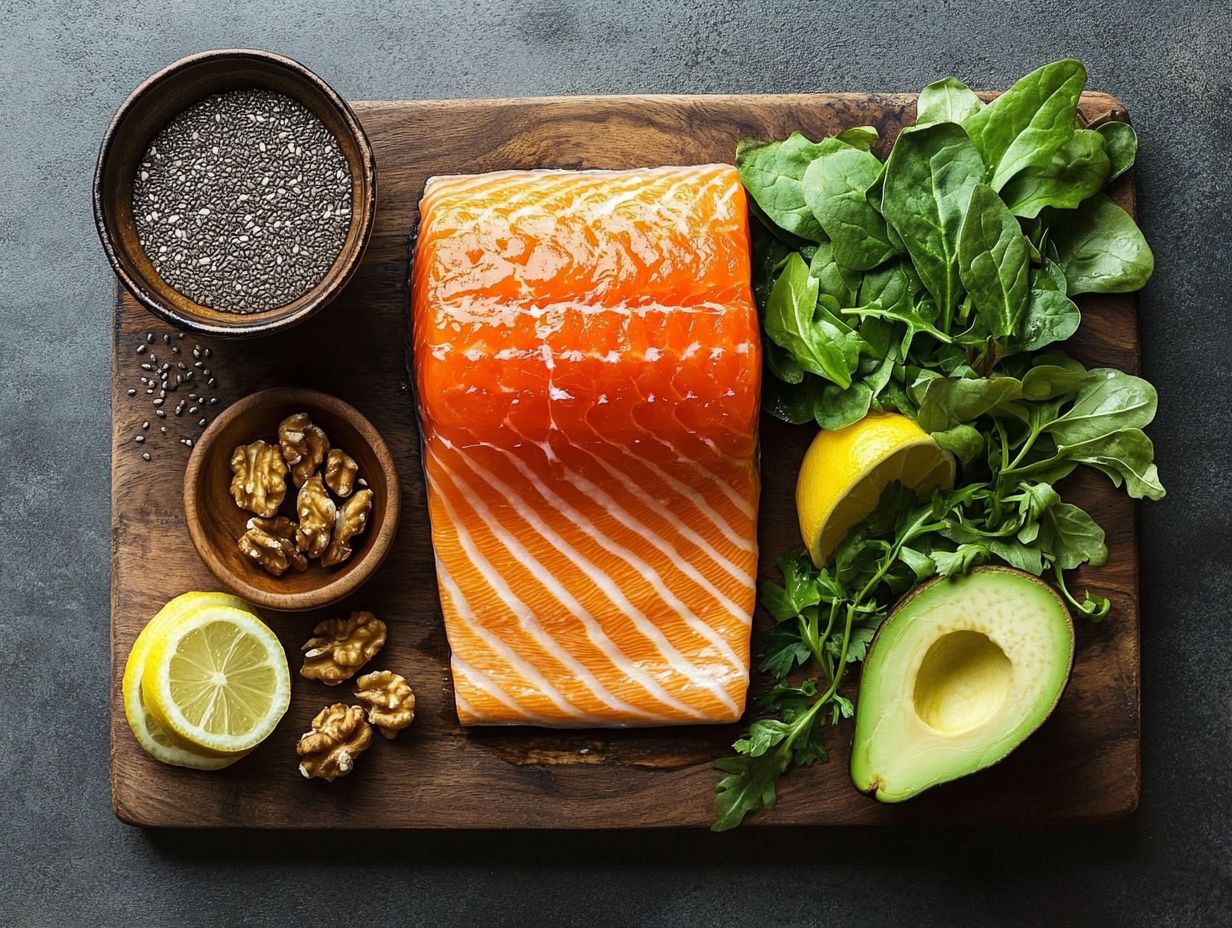
The Keto Diet, also known as the ketogenic diet, is a high-fat, low-carbohydrate dietary plan that is used to promote weight loss and improve overall health. Omega-3s are essential fatty acids that play a crucial role in heart and brain health, making them an important component of the Keto Diet. This diet has gained popularity alongside other dietary strategies such as the paleo diet and intermittent fasting.
What are the benefits of including Omega-3s in a Keto Diet?
Omega-3s help reduce inflammation and have been shown through clinical research to lower the risk of chronic diseases such as heart disease, diabetes, and metabolic syndrome for those following a Keto Diet. These essential fats also aid in weight loss by promoting satiety, supporting a healthy metabolism, and improving fat-burning processes.
Where can I find sources of Omega-3s on a Keto Diet?
The best sources of Omega-3s for those on a Keto Diet include fatty fish such as salmon, sardines, and mackerel, as well as plant-based sources like chia seeds, flaxseeds, and walnuts. Including nutrient-dense leafy greens and vitamin-packed meals can help meet your omega-3 needs. It is recommended to aim for 2-3 servings of fatty fish per week and complement these with omega-3 supplements like fish oil capsules or fish oil liquid from reputable brands such as Bare Biology.
Can I take Omega-3 supplements while on a Keto Diet? What about fish oil?
Yes, it is possible to supplement with Omega-3s while following a Keto Diet. Look for supplements that contain both EPA and DHA, the two main types of Omega-3s, and stick to the recommended dosage on the label. Fish oil or omega-3 supplements are particularly beneficial for filling any nutritional gaps and supporting overall cognitive function and blood lipid profiles.
Are there any risks or health risks to consuming Omega-3s on a Keto Diet?
While Omega-3s are generally safe to consume, it is important to be mindful of the source. Some fish, such as swordfish and tilefish, may contain high levels of mercury which can be harmful in large amounts. It is best to stick to fatty fish that are lower in mercury and opt for plant-based sources as well. Additionally, consider the health benefits of omega-3 supplements derived from algae for a safer alternative.
Can I still follow a Keto Diet if I am vegetarian or vegan? What about the Paleo or Caveman Diet?
Yes, it is possible to follow a vegetarian or vegan Keto Diet while still obtaining enough Omega-3s. Plant-based sources such as chia seeds, flaxseeds, and walnuts are all suitable for vegetarians and vegans. Additionally, there are Omega-3 supplements made from algae available for those who do not consume fish or animal products.
Supplementing with magnesium and other electrolytes can also support the diet s health benefits.

